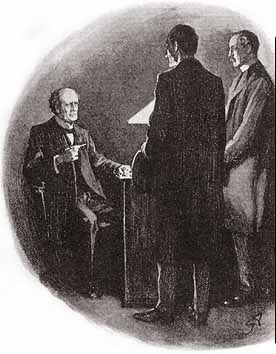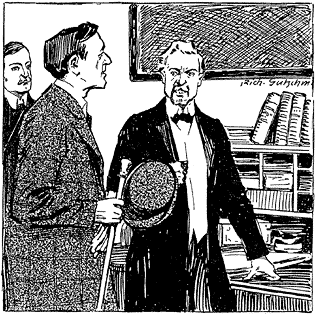| The Missing Three-Quarter 6 | The Missing Three-Quarter 7 |
It was already dark when we reached the old university city. Holmes took a cab at the station and ordered the man to drive to the house of Dr. Leslie Armstrong. A few minutes later, we had stopped at a large mansion on the busiest thoroughfare. We were shown in, and after a long wait were at last admitted into the consulting-room, where we found the doctor seated behind his table.
It argues the degree in which I had lost touch with my profession that the name of Leslie Armstrong was unknown to me. Now I am aware that he is not only one of the heads of the medical school of the university, but a thinker of European reputation in more than one branch of science. Yet even without knowing his brilliant record one could not fail to be impressed by a mere glance at the man, the square, massive face, the brooding eyes under the thatched brows, and the granite moulding of the inflexible jaw. A man of deep character, a man with an alert mind, grim, ascetic, self-contained, formidable – so I read Dr. Leslie Armstrong. He held my friend’s card in his hand, and he looked up with no very pleased expression upon his dour features.

“I have heard your name, Mr. Sherlock Holmes, and I am aware of your profession – one of which I by no means approve.”
“In that, Doctor, you will find yourself in agreement with every criminal in the country,” said my friend, quietly.
“So far as your efforts are directed towards the suppression of crime, sir, they must have the support of every reasonable member of the community, though I cannot doubt that the official machinery is amply sufficient for the purpose. Where your calling is more open to criticism is when you pry into the secrets of private individuals, when you rake up family matters which are better hidden, and when you incidentally waste the time of men who are more busy than yourself. At the present moment, for example, I should be writing a treatise instead of conversing with you.”
“No doubt, Doctor; and yet the conversation may prove more important than the treatise. Incidentally, I may tell you that we are doing the reverse of what you very justly blame, and that we are endeavouring to prevent anything like public exposure of private matters which must necessarily follow when once the case is fairly in the hands of the official police. You may look upon me simply as an irregular pioneer, who goes in front of the regular forces of the country. I have come to ask you about Mr. Godfrey Staunton.”
“What about him?”
“You know him, do you not?”
“He is an intimate friend of mine.”
“You are aware that he has disappeared?”
“Ah, indeed!” There was no change of expression in the rugged features of the doctor.
“He left his hotel last night – he has not been heard of.”
“No doubt he will return.”
“To-morrow is the ’Varsity football match.”
“I have no sympathy with these childish games. The young man’s fate interests me deeply, since I know him and like him. The football match does not come within my horizon at all.”
“I claim your sympathy, then, in my investigation of Mr. Staunton’s fate. Do you know where he is?”
“Certainly not.”
“You have not seen him since yesterday?”
“No, I have not.”
“Was Mr. Staunton a healthy man?”
“Absolutely.”
“Did you ever know him ill?”
“Never.”
Holmes popped a sheet of paper before the doctor’s eyes. “Then perhaps you will explain this receipted bill for thirteen guineas, paid by Mr. Godfrey Staunton last month to Dr. Leslie Armstrong, of Cambridge. I picked it out from among the papers upon his desk.”
The doctor flushed with anger.
“I do not feel that there is any reason why I should render an explanation to you, Mr. Holmes.”
Holmes replaced the bill in his notebook. “If you prefer a public explanation, it must come sooner or later,” said he. “I have already told you that I can hush up that which others will be bound to publish, and you would really be wiser to take me into your complete confidence.”
“I know nothing about it.”
“Did you hear from Mr. Staunton in London?”
“Certainly not.”
“Dear me, dear me – the postoffice again!” Holmes sighed, wearily. “A most urgent telegram was dispatched to you from London by Godfrey Staunton at six-fifteen yesterday evening – a telegram which is undoubtedly associated with his disappearance – and yet you have not had it. It is most culpable. I shall certainly go down to the office here and register a complaint.”
Dr. Leslie Armstrong sprang up from behind his desk, and his dark face was crimson with fury.

“I’ll trouble you to walk out of my house, sir,” said he. “You can tell your employer, Lord Mount-James, that I do not wish to have anything to do either with him or with his agents. No, sir – not another word!” He rang the bell furiously. “John, show these gentlemen out!” A pompous butler ushered us severely to the door, and we found ourselves in the street. Holmes burst out laughing.
| The Missing Three-Quarter 6 | The Missing Three-Quarter 7 |